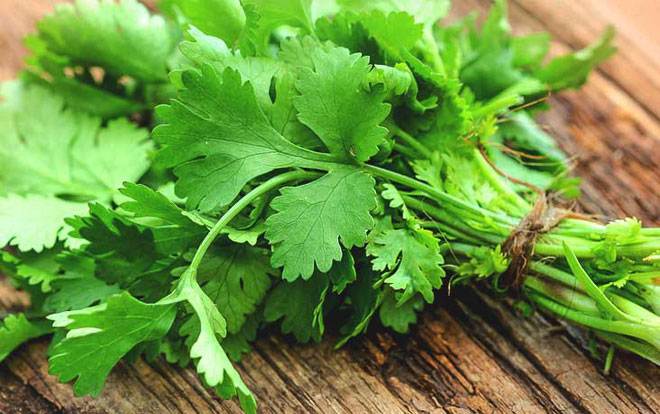Why do people eat coriander and see soap?
There are those who do not enjoy the hot cast cake and break some coriander stalks above.
Anything has two sides, dividing the whole humanity into two halves: half will like it and half will hate it. Today's article will have coriander, making half of the world extremely excited with the cool taste it brings, the other half bluntly states that its smell is like soap, metal, or musty smell Some people do not hesitate to compare coriander with cat's urine.
Why is there such an opposing difference?

Since the 16th century onwards, Europeans have been extremely hostile to the coriander because of its unusual taste.
Most culinary delights enjoy coriander, but many places, especially Western countries, cannot tolerate its smell. But it is not the desire to hate vegetables that arises. In a scientific report published in 2001, Helen Leach, an anthropologist teaching at Otago University, discovered that since the 16th century onwards, Europeans have been extremely hostile to coriander because of a different taste. its.
Ms. Leach thinks that Europeans cannot tolerate coriander is most likely due to its name. In English, "coriander" is "coriander / cilantro", originally from the ancient Greek " koris" , meaning "bug". The coriander leaf itself is similar to a bug, so people think of the unpleasant smell of coriander as it resembles a bug. Those who lived under the reign of Queen Victoria refused to add coriander to the dish.
It wasn't until after World War II, the culture of trying strange food from other regions flourished, and at that time coriander could only enter the European table.
Another study by Lilli Mauer and Ahmed El-Sohemy from the University of Toronto says 17% of Caucasian Caucasians hate coriander tastes, only 4% of Hispanic and Hispanic hate coriander and only 3% of Central Asians share the same view. In Mexican cuisine, people make use of all the cool aromas and coriander. Vietnam is also known for adding coriander to the dish. The report suggested that eating cilantro from a young age made Asians familiar with a different taste .
However, the "hate" coriander also has a deeper source than that. Recent studies show that there is a gene that regulates how we feel the smell of coriander in our mouths . The 23andMe company specializing in genes has organized research, found a small DNA change in the olfactory gene that makes coriander taste like soap.

There is a small change in DNA in the olfactory gene that makes coriander taste like soap.
Following that trace, they found the OR6A2 gene that was the culprit that made the cool coriander taste soapy in many people's mouths.
Research on twins reinforces the hypothesis "at the human gene where coriander tastes". Preliminary research by Monell's Chemistry Sensory Center, led by scientist Charles Wysocki, shows that 80% of twins and eggs have different coriander sensations, only 42% of other twins have eggs. Similar feelings. If genes play an important role, the use of coriander in cuisine is determined by the gene, not the culture or any other factor.
Much research is just to know the origin of "coriander hatred" . Whether it is delicious or not depends on the taste of the taster, just like beauty in love.
- Soap 'magnet' oil spill cleanup
- Techniques for growing scent of ships treating diseases in pots
- With this soap, you will never have to worry about slippery, easy to fall again
- The color of 'illusion' comes from the soap bubble
- Video: What happens when we put soap into the microwave?
- The soap is sufficiently colored in red and purple blue, why is it only white?
- The US officially issued a ban on antibacterial soap
- Is antibacterial soap safe?
- The 19-year-old girl ate soap like candy
- Coriander essential oils can kill resistant bacteria
- Students make black soap from rice husk
- Why can soap bubbles explode?
 'Fine laughs' - Scary and painful torture in ancient times
'Fine laughs' - Scary and painful torture in ancient times The sequence of numbers 142857 of the Egyptian pyramids is known as the strangest number in the world - Why?
The sequence of numbers 142857 of the Egyptian pyramids is known as the strangest number in the world - Why? History of the iron
History of the iron What is alum?
What is alum?